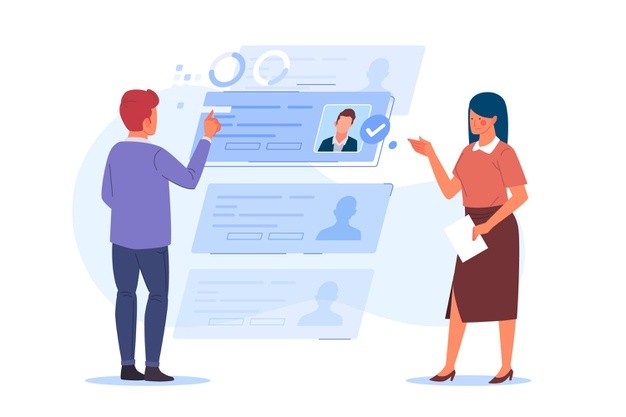While HR functions can be complex, companies that employ flexible workers, like wholesale, skilled trades manufacturing, franchises, and many more – may face difficulties that stem from the never-ending process of hiring, and managing full-time, part-time, or seasonal salaried and non-salaried employees. A lot of entrepreneurs and managers could have to spend more time than they’d prefer to spend doing non-essential tasks.
Here are five suggestions for medium and small size enterprises (SMBs) who wish to reduce the time they spend managing their HR and instead put their energy and time into building a strong workforce, and ultimately driving business success.
1. Make the most of your data to guide the workforce’s decisions
- For managers, business owners, and HR managers, Workforce Analytics offers customizable robust, and scalable reports that are user-friendly and effective. Users can drill into crucial information to plan the future needs of staffing and also predict their employee’s duration based on the trends of attrition.
- Integrated with HR Software India, Workforce Analytics gives small businesses access to extensive data gathered from a single platform and provides the in-depth analysis that is required to provide accurate reports and forecasting for making informed business decisions.
2. Work hours can be tracked more efficiently
- In industries that have constant shift changes and high turnover of employees tracking employee hours may seem like an all-day job of its own. The problem gets worse when managers are managing payroll and employee time using spreadsheets, manually filled timesheets, and papers.
- For businesses that are relying on paper forms, the administrative burden of tracking time could hinder business growth.
- doing HR in the traditional method is not just an inconvenience but can cause errors, leading to costly errors.
- An attendance and time system which can record the time each day electronically helps in making tracking employee hours simple and automated.
- The best HR technology solution for businesses with a large workforce fluctuation is one that is efficient and seamlessly integrates attendance and time information into their payroll software.
- It can also help owners control employee schedules, and also provides dashboards that provide insight into important metrics and reports to assist them in understanding
- the cost of their operations. This HR software must be user-friendly to allow employees to navigate it by themselves and give business owners to focus on other aspects of running their business.
3. Let employees handle a lot themselves with their personal HR issues
- Many employers spend time logging and maintaining HR data for employees as well as answering employees’ urgent HR queries and tackling documents that employees would otherwise manage themselves.
- This HR time is often heightened for businesses that are subject to seasonality.
- For instance, by using an online self-service platform as well as a mobile app, TriNet’s tailor-made HR system permits employees of small and medium-sized businesses to maintain and update their personal HR records.
- Benefits enrollment online and support allow employees to have the ability to choose their benefits.
- It also gives simple access to HR functions like making time-off request requests and getting a complete overview of the payroll data. In addition, employees are able to connect to a directory of their company and interact directly with their colleagues via the application.
4. Find an HR service provider who understands the industry you work in.
- When it comes to the success of your business it is your employees who matter the most. Small business owners tend to be aware of their employees with their best interests in mind however, the best intentions don’t always suffice in terms of compliance.
- Companies, particularly those operating in multiple states, and have an employee pool that is flexible, often have to deal with complicated labor laws, practices, and other HR regulations that are constantly evolving.
- The companies that decide to deal with complicated HR issues on their own could end up at risk of being in trouble, placing their company in danger of not being in compliance with the rules and rules and regulations.
- An HR team comprised of industry-specific HR specialists can bridge the gap between the good intentions of an employer and the needs of HR for their employees.
- A good HR solution will provide advice on best practices for HR as well as complete workers’ compensation insurance and management of claims.
5. Choose a vendor that can meet your HR requirements
- When an owner of a business reaches the point of realizing they require assistance in managing their HR issues, such as benefits, payroll, and other HR issues it can be a struggle to determine which kind of assistance is best for them, and where to get it.
- Think about the scenario for customer HST Materials, Inc. Prior to locating HST Materials, Inc. had a single vendor handling their payroll. Another was in charge of their benefits for employees and cash balance plan, and also an HR lawyer who could help with the HR-related questions of their employees. According to HST’s CEO, Kathryn Miller, it will require at least one full-time worker to handle benefits including payroll, hiring, onboarding, and answering any questions of the employees of her company.
- As per Kathy, “hiring one or two HR administrators full-time could mean fewer machine operators or other highly skilled employees on the floor, and less revenue coming through the through the door.”
- Custom-designed HR solutions for specific industries can assist businesses in avoiding the time and money that may be a result of one-size-fits-all solutions or by incorporating employees in various platforms to manage all of their benefits.
- HR service providers, like Professional Employer Organizations (PEOs), offer a variety of services but the following are some that businesses who have flexible workforces might want to think about when choosing what option to take for their HR department:
A quick snapshot of your most pertinent HR-related data using workforce analytics.
Solutions that are specific to your industry can know your HR needs.
Powerful time and attendance capabilities to schedule and keep track of hours.
A payroll system that integrates with a variety of different Time and Labor Management and Point of Sale (POS) applications.
Self-service on the web that is simple and secure, as well as having easy mobile access.
Professional compliance and risk reduction services to help protect your business from risk by providing guidance on HR Employment practice Liability insurance (EPLI) protection as well as claims management, and online support.
A workers’ compensation plan which includes Aplus rated coverage for carriers and workplace safety classes, assessments of workplace safety, and claim management to ensure the safety of your company.
Access to the enterprise-level employee benefits plans as well as support to comply in accordance with the Affordable Health Care Act (ACA), COBRA as well as disability rules and state-specific filings.





